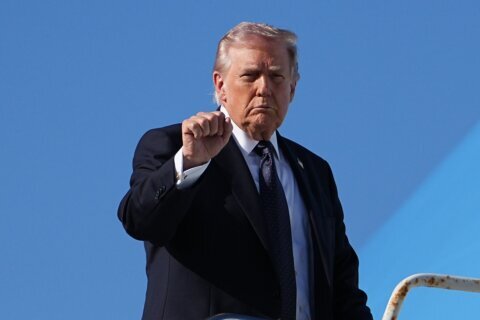
The issue of impeachment has simmered on Capitol Hill for close to a month, following a House vote in December, but now it’s going to dominate the Senate in a way that only the trial of a president can.
For only the third time in U.S. history, a president is about to go on trial, now that an impasse has ended and the two articles of impeachment against President Donald Trump on charges of abuse of power and obstruction of Congress have been sent over to the Senate.
Senate Majority Leader Mitch McConnell wants to use the 1999 impeachment trial of former President Bill Clinton as the template for Trump’s trial, which centers in part on the withholding of U.S. aid to Ukraine.
House Speaker Nancy Pelosi and Democrats argue that trial is not the right model, because it was preceded by a lengthy investigation by the independent counsel, Kenneth Starr. They point out that the investigation of Trump has relied on House hearings and witnesses who were willing to testify, even when the White House didn’t want them to.
“He did all this for his personal political gain,” said Jerry Nadler, House Judiciary Committee chairman, on the House floor. “And then he violated the Constitution by stonewalling Congress’s efforts to investigate.”
House Minority Leader Kevin McCarthy contends the Democrats’ investigation was due to contempt for the president. “I had hoped this day would not come. I would hope those [who] uphold the Constitution would believe in the rule of law, instead of the spite or the dislike of an individual,” he said.
While the Constitution will no doubt be cited extensively during the president’s Senate trial, it won’t be the kind of trial that wraps up neatly, like on “Law and Order.” It’s widely assumed the president will be acquitted by the Republican-controlled Senate, but there are plenty of twists and turns that can take place in the coming weeks.
The biggest question mark heading into the trial is whether witnesses will eventually be called to testify.
Former National Security Adviser John Bolton has said he would testify if issued a subpoena by the Senate. Democrats also want to hear from three others, including acting White House Chief of Staff Mick Mulvaney.
Democrats argue they can show that the president directed the congressionally approved aid to be withheld because he wanted to get its new leader to commit to an investigation involving Hunter Biden, the son of political rival and former Vice President Joe Biden. Hunter Biden once worked for the Ukrainian-based energy firm Burisma.
Several Republicans have called for Hunter Biden to testify at the trial, along with the whistleblower, who first raised alarms about Trump’s phone call with Ukrainian President Volodymyr Zelenskiy.
While congressional Republicans have been sharply critical of the impeachment proceedings, they have not denied the substance of what took place involving Ukraine. The president has suggested he never had a chance to present his side during the House impeachment proceedings. The White House was allowed to have legal counsel represent the president during public hearings but declined.
McConnell has made it clear he won’t consider witnesses at the outset of the trial, which begins in earnest on Tuesday. But he did say he would let senators consider witnesses later in the trial, which was what happened during the Clinton trial. (Democrats point out, however, that Monica Lewinsky had already been deposed on videotape).
Trump’s trial will operate in a much more politically polarized environment than the Clinton impeachment, though there was plenty of partisanship to go around two decades ago. Because so much could turn on whether witnesses are called, several moderate Republicans are once again under the microscope as to how they’ll vote on key procedural questions.
They include Maine Sen. Susan Collins; Alaska Sen. Lisa Murkowski; Utah Sen. Mitt Romney; and Tennessee Sen. Lamar Alexander. All have indicated they could be open to hearing witness testimony as the trial moves forward.
For now, it’s unclear exactly who, if anyone, will testify at the president’s trial. But the issue will probably determine whether the trial is relatively short — perhaps a couple of weeks — or whether it stretches beyond that.
If it goes longer, the trial will carry into another political realm: the Iowa caucuses, the New Hampshire primary and the intensifying 2020 presidential campaign. The trial is also supposed to be in session six days a week, limiting campaigning for presidential candidates who happen to serve in the upper chamber: Sens. Bernie Sanders, Elizabeth Warren, Amy Klobuchar and Michael Bennet.
Whether they are running for president or not, senators will also be required to do something many aren’t used to during the trial: They won’t be able to speak on the Senate floor while the trial is in session. It’s not allowed under the rules.








